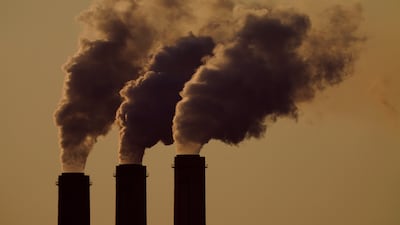Top Saudi Arabian enterprises, including the world’s largest oil exporting company Saudi Aramco, have signed preliminary agreements with the kingdom’s sovereign wealth fund to become partners in the region’s first voluntary carbon market (VCM).
The kingdom’s national airline Saudia, clean energy developer Acwa Power, mining and minerals giant Ma’aden, Enowa, a subsidiary of Neom, and Saudi Aramco have all signed separate non-binding agreements as potential market partners, the Public Investment Fund said on Wednesday.
The partners will support the PIF in the development of the VCM, which is expected to be launched next year, through the supply, purchase and trading of carbon credits.
Additional partners for the exchange will be announced in the coming months, before an initial round of auctions expected to take place in the fourth quarter of this year, the PIF said.
“The support of Saudi businesses, which are world leaders in their fields, is a strong demonstration of the exciting potential of this market,” said PIF governor Yasir Al Rumayyan.
“PIF contributes to Saudi Arabia’s efforts through driving the investment and innovation required to address the impact of climate change and achieve net zero carbon emissions by 2060.”
Voluntary carbon markets allow companies to offset their emissions by purchasing carbon credits of projects aimed at removing or reducing greenhouse gases. A credit, once used for this purpose becomes an offset, is considered retired credit and no longer tradable.
Carbon markets have grown rapidly in recent years across the world, at a compound annual growth rate of 30 per cent to reach $1 billion of traded value. They have the potential to grow 15-fold by 2030, estimates by the Taskforce on Scaling Voluntary Carbon Markets, a private sector initiative, show.
governor, PIF
Saudi Arabia, the world's largest crude exporter, has set ambitious targets to fight climate change and cut carbon emissions as part of its Vision 2030 plan to overhaul its economy and reduce its reliance on oil.
The kingdom aims to reduce emissions by generating 50 per cent of the country's energy from renewable sources by 2030, Crown Prince Mohammed bin Salman, who heads the PIF, said in April last year.
The PIF first announced the VCM initiative in September, in partnership with the Arab world's biggest bourse, Tadawul, as a platform for offsets and carbon credits within the Middle East and North Africa region.
The platform is designed to become the primary destination for companies and institutions that aim to cut emissions, or contribute towards reductions, through the trading of verified, approved carbon equivalent credits certificates, the state-run Saudi Press Agency said at the time.
The launch of the carbon market is part of PIF’s Green Finance Framework, and in line with the kingdom’s ambitions to become carbon neutral by 2060 and develop its green economy.
While internal decarbonisation targets of companies should remain the priority, the carbon market can “effectively complement their efforts until and when they reach net zero”, the PIF said.
“Carbon credits complement our wider emissions reduction strategy and represent an important tool in the energy transition, as we continue to play our part in meeting the world's need for secure, affordable and ever more sustainable energy," said Amin Nasser, president and chief executive of Aramco.


